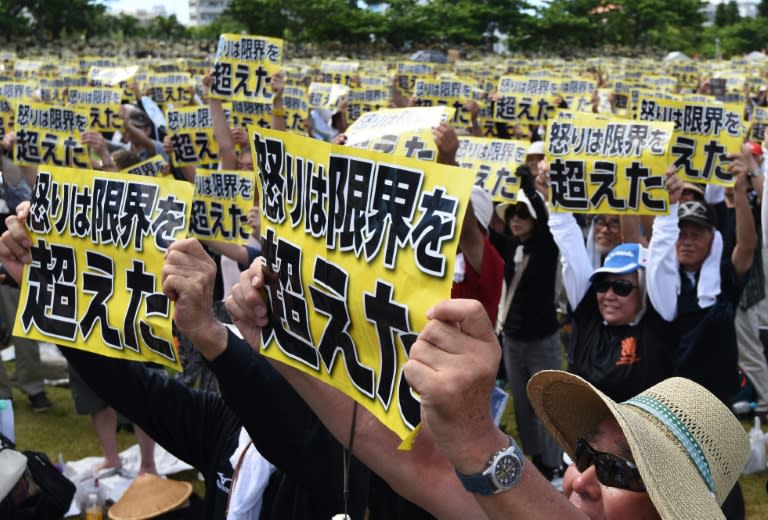With mixed roots, Okinawa leader takes base relief message to US
Of all the issues facing US military planners in Asia, few have persisted for so long -- and seen such little resolution -- as opposition to the troop presence in Okinawa. But the Japanese island's newly elected governor is hoping to break the stalemate by taking his message directly to the United States -- where he is emphasizing his roots in both cultures. Denny Tamaki was born to a US Marine father, whom he never met, and a Japanese mother and is campaigning against the construction of a new US base. On a trip to Washington and New York barely a month after taking office, Tamaki said he hoped his message would appeal to President Donald Trump, who has mused about cutting US military commitments overseas. "I don't know how much President Trump knows about Okinawa but it is obvious that there are lots of US bases on the island and that this concentration is unfair," Tamaki said in Washington, where he was meeting Defense Department and State Department officials. "This is why we are requesting that some bases move out of Okinawa to other countries including the United States or Australia. I believe the Okinawan people have the right to call for a reduction to our burden," he told AFP. - Building base 'on tofu' - Okinawa, which was under US occupation until 1972 and lies strategically close to the Taiwan Strait, accounts for less than one percent of Japan's land area but plays host to more than half of the 47,000 US troops in the treaty-bound ally. Incidents involving US forces -- ranging from a helicopter's emergency landing in January to, most notoriously, three soldiers' gang-rape of a 12-year-old girl in 1995 -- have led to frequent spikes in tension, although Washington has regularly apologized and promised sensitivity. A longstanding source of grievance is the Marines' Futenma Air Station, located in the thick of what has become a dense urban area. In a bid to ease local concerns, the two countries agreed in 1996 to move Futenma's air operations to the isolated town of Nago. But they have encountered opposition ever since, in part because Nago is home to a sensitive coral reef and dugongs, endangered sea mammals. "According to our investigations, there is very soft ground -- like mayonnaise or tofu -- and underneath it is said that there are active faults that lead to earthquakes," Tamaki said. "So it's obvious that a new base can't be built there." But Tamaki, elected in a special election after his predecessor died, faces strong opposition even in Japan, where Prime Minister Shinzo Abe -- a conservative focused on defense -- wants to press ahead with the base plan. - 'I love rock 'n' roll' - Tamaki, 59, believes that his US heritage makes him a natural envoy to resolve the base issue. "I believe I represent the diversity of Okinawa," he said. "I am proud to have two roots." But his experience in the United States is mostly limited to trips when he was a parliamentarian. His father left Okinawa before he was born and he said he has not tried to locate him, although he remains curious. "If I could meet him, I would like to give him a big hug," Tamaki said, grinning and holding out his arms. Tamaki's relationship with the United States appears to be less about his father and instead more typical of Okinawans, who have grown up in a culture heavily influenced by US bases. One key area is music. Tamaki said he grew up listening to tunes on the jukeboxes in US troops' bars. The future governor served as a host of a pop radio show for 10 years and played guitar in a band. "I love rock 'n' roll!" he said, switching briefly and enthusiastically to English. A fan of guitar rock, Tamaki lists Eric Clapton as a favorite along with two mega-bands of the 1990s, Foo Fighters and Nickelback. Tamaki said his experience with US culture was indicative of Okinawans. "I believe that a majority of Okinawans are not against the Americans," he said. "But because there are a lot of bases, which have caused incidents and accidents including noise pollution and environmental pollution, and at the same time some US service members have caused some trouble, that is why I believe Okinawans are very concerned."




